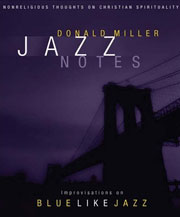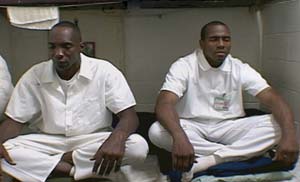 Five years ago Thomas Nelson Publishers took a chance on a relatively unknown author, Donald Miller, and published a slightly unorthodox memoir, “Blue Like Jazz.” The word of mouth for the raw and reflective anecdotes in the book soon had “Jazz” on the New York Times best-seller list, receiving praise from evangelical and secular circles. To celebrate the success of the book, Thomas Nelson is repackaging “Jazz” into a new hardcover edition with updates and a bonus CD with thoughts from Miller. This remix of Miller’s work, entitled “Jazz Notes”, will be in bookstores next week, and takes a “greatest hits” approach to the many non-religious musings of Miller.
Five years ago Thomas Nelson Publishers took a chance on a relatively unknown author, Donald Miller, and published a slightly unorthodox memoir, “Blue Like Jazz.” The word of mouth for the raw and reflective anecdotes in the book soon had “Jazz” on the New York Times best-seller list, receiving praise from evangelical and secular circles. To celebrate the success of the book, Thomas Nelson is repackaging “Jazz” into a new hardcover edition with updates and a bonus CD with thoughts from Miller. This remix of Miller’s work, entitled “Jazz Notes”, will be in bookstores next week, and takes a “greatest hits” approach to the many non-religious musings of Miller.
While “Jazz Notes” is a greatly streamlined version of the original memoir, it does hit most of the best stories from “Blue.” Readers will still encounter Miller’s friends from his Reed College days— Tony the Beat Poet and Laura, the skeptic who becomes a believer. And then, of course, the most memorable moment of setting up a confessional booth during the annual decadent Ren Fayre event at Reed is there as well. But I have always thought that more than the events or characters in Miller’s stories, what has made “Jazz” an anthem for a generation is Miller’s authentic way of discussing doubts and fears about postmodern Christianity while in the same breath sharing a deep love of Jesus.
There are updates at the end of “Notes” that gives some information of the upcoming movie version of the book that former Christian rocker Steve Taylor is directing (In spite of how his last flick “The Second Chance” turned out, I really, really want to believe that somehow they can make this movie work.)
While I am not sure that the updates and bonus material are enough for “Jazz” fans such as myself to rush out and buy this, I do highly recommend ianyone looking for an inexpensive but classy graduation gift for your favorite millennial, to check this book out. I also think this shortened version of his work is perfect for introducing someone— especially those who are spiritual seekers—to Miller’s reflections on walking out the Christian faith.


